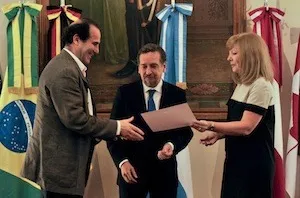Historian Diego Armus Honored by Argentina's Science Ministry

Associate Professor of History Diego Armus is the first humanities and social sciences scholar to receive the R.A.I.C.E.S. award from the Ministry of Sciences in Argentina. The award recognizes academic achievements of Argentines who maintain connections with Argentine-based research groups while pursuing scientific endeavors abroad.
"My work is not the history of medicine, this upbeat story that commands the story of scientific achievements," Armus said on accepting the award in Buenos Aires last month. "It is a story of disease in its historical, cultural and social contexts, how society and culture interacted with a disease in a specific place and time, how a disease is saturated by issues that go well beyond its biomedical dimensions. To me, a disease is much more than a bacillus or a virus."
Armus is the author of The Ailing City, in which he explores the metaphors, state policies, and experiences associated with tuberculosis in Buenos Aires between 1870 and 1950. The book, with published versions in English and Spanish, will also soon be available in Italian. Armus has also played a key role in facilitating the formation of an Argentine network of scholars working on the social and cultural history of disease and health while collaborating as an invited professor in graduate programs at several Argentine universities.
"I am pleased for this explicit recognition of the Ministry of Sciences to the contributions of the humanities and social sciences," Armus added, "which are not usually acknowledged in scientific circles." He hopes the trend is one that continues.
Armus is the editor of Disease in the History of Modern Latin America: From Malaria to AIDS (2003), as well as a number of other books in Spanish, Portuguese, and English. Armus, who joined Swarthmore's faculty in 2001, teaches courses on Latin American history with an emphasis on urban and sociocultural issues. He also coordinates the Swarthmore in Buenos Aires Program.



